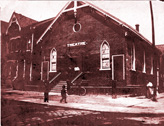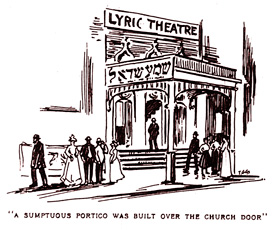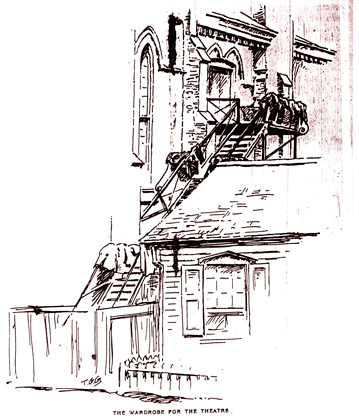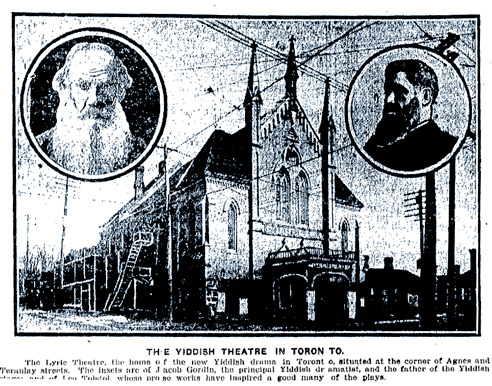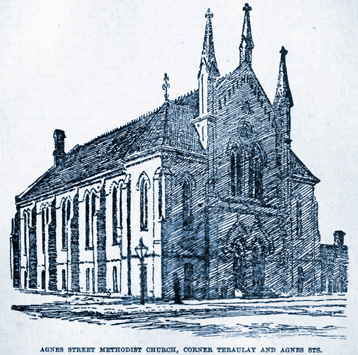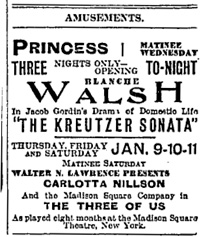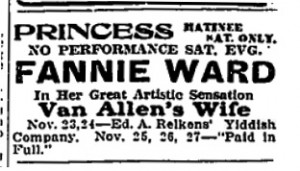Grand Opening of New Jewish Theatre
Quite an Up-to-Date Playhouse with All Sorts of Conveniences — Notables See the Play.
From the Toronto Star, May 5, 1909
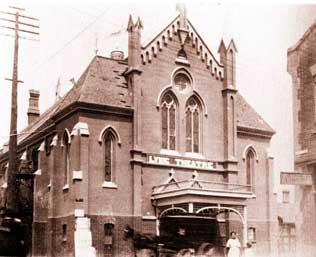 With waving of flags and the making of many speeches, the new Jewish theatre, called the Lyric, at Agnes and Teraulay streets, was opened last night as the very latest of Toronto’s playhouses.
With waving of flags and the making of many speeches, the new Jewish theatre, called the Lyric, at Agnes and Teraulay streets, was opened last night as the very latest of Toronto’s playhouses.
It is the successor to the little “People’s Theatre” on University avenue and, like that playhouse, is a church on the outside and a theatre within. Very few of the old members of Agnes street Methodist Church would have recognized their old meeting-place had they been present last night, but what has been a loss to the Gentiles is a gain to the Hebrews, for they how have, as one speaker put it, “a theatre which is worthy of the large and important Jewish section of our city.”
Galleries, Boxes, Etc.
The Lyric is in every respect an up-to-date theatre. Pasternack and Robinovitch, the proprietors, are said to have spent nearly $35,000 on the property and alterations. There are two galleries, “regulation boxes,” comfortable dressing-rooms downstairs in the old Sunday school rooms, and all the latest improvements for the convenience of the public and the actors.
Of course, the plays are given in Yiddish. It is a Jewish theatre, for the Jewish people, and the fine points of the play are all lost on the uninitiated. The acting last night, however, was of no mean order. The Boston Stock Company, with J. Silbert as the leading man, held the boards yesterday, and will continues to be the attraction for a couple of months to come.
“I give all of Shakespeare’s plays, except, of course, those dealing with the Jews,” said Mr. Silbert in his dressing room between the acts last night. “I have a company of sixteen people, and we are here to make it go. If the Jewish people do not give us the support we want, I shall open the place to the English-speaking people and run high-class vaudeville.”
At last night’s grand opening, the place was comfortably filled, the seating capacity being some 1,100. In the boxes and the front seat of the orchestra were seen many of the prominent members of the Jewish section of the city, as well as a large sprinkling of Gentiles. Controller Geary and Ald. Maguire occupied a box to the right of the stage, and took an active part in the speech-making between the acts. Mr. Henry, of the Gayety, was also in evidence, as was Mr. Clark, of the “Runaway Girls Company.”
The theatre was gaily decorated with flags and bunting, and excellently lighted throughout. The staging of the play would have done credit to more than one of the other theatres in the city, and altogether it looks as if the Lyric has come to stay. ♦
* * *
The newly opened Lyric Theatre was not the only venue for Yiddish plays in the city in 1909, as evidenced by this review from the Toronto Star:
Review of “The Devil,” presented by the Thomashevskys
From the Toronto Star, May 18, 1909
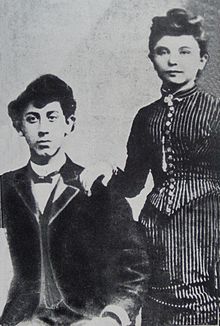 Some who went to scoff remained to praise at the Princess Theatre last night.
Some who went to scoff remained to praise at the Princess Theatre last night.
“The Devil,” in Yiddish, presented by Mr. and Mrs. Thomashefsky and a capable company, drew a thousand people to the theatre, and the Gentiles were mighty few in number. The production proved to be a most satisfactory one from a historic standpoint.
The stage settings were plain and poor, and the lights were badly managed, but the acting of the principals fell little, if anything, short of the Savage company that presented the Molnar comedy here last December.
Yiddish players are strong on emotion, and this company makes the most of the stronger scenes in “The Devil” — perhaps overdoing the scene where the devil pours the poison of evil suggestion into the ears of the tempted pair, and joins their hands. But credit must be given Mme. Bessie Thomashefsky for one good point — she made the blouse-removal scene in the studio much less offensive than did either Miss Nordstrom or Miss Elliston, who had the role of Olga in the other companies. She did it neatly and as modestly as possible.
Mr. Boris Thomashefsky’s rotund physique did not fit him for the part of the Devil, and he made one think that he must be a Scotch devil by wearing a waistcoat that looked like a tartan plaid. In other respects his make-up was unsatisfactory, too, but his acting was very good. He was a smiling, suave, subtle, suggestive Devil, and he used voice and facial expression to good effect.
Mr. Joseph Kessler has an attractive stage presence, and gave a very natural portrayal of the role of Carl, the artist. Miss Rosetta Cohen made a clever Mimi, the model, and the other lesser roles were handled satisfactorily. ♦
* * *
Here is a rather strange item indicating that the police were called to the Elm Street Yiddish Theatre after receiving a complaint that the “regular sale of tickets” had been conducted on the premises.
From The Toronto Globe, October 28, 1907
Police at Jewish Theatre
Found Performance was Only in Aid of Sick Young Woman
An entertainment given at the Jewish Theatre, Elm street and University avenue, last evening was attended by Inspector Cuddy and Patrol Sergt. Snider, who went there after a complaint had been received that there was a regular sale of tickets for a performance.
Investigation showed that there had been no sale of tickets, but there was a collection taken up in aid of a young girl who is ill. Men were smoking and the great majority of them were wearing their hats when the police entered. ♦
* * *
Here is a story indicating that at least one critic of a major Toronto newspaper was sensitive enough to put the rise of Yiddish theatre into cultural context, locally and internationally, and to see the rise of a local Yiddish theatre as an important, perhaps even fascinating, contribution to the cultural life of the city.
Lyric Theatre Home of Serious Yiddish Plays
Is Evidence of Sudden Growth of a National Drama — Productions are Mostly Tragical — Jewish Acting, Originated in America, is Only Forty Years Old — Peculiarly Its Own — Jacob Gordin, Its Father, Wrote Close to One Hundred Scores
From the Toronto Star, February 28, 1914
At the corner of Agnes and Teraulay streets, in the centre of the foreign quarter of St. John’s Ward, stands the Lyric Theatre, the Yiddish playhouse of Toronto. It was built six years ago to accommodate the concerts, lectures, and dramas of the Jews.
During those six years it has been occupied by stock companies of players acting in Yiddish drama, and is at present hired by a stock company of ten, headed by Samuel Auerbach and his wife, Madame Schoengold, who put on different plays every Wednesday, Friday, and Saturday evenings before a very good-sized audience, considering Toronto’s Jewish population of 22,000. Sunday musical concerts and motion-pictures at odd times are also given. There is a seating capacity of about 400.
Those are the local and well-known features. But the Lyric Theatre stands as an evidence of one of the greatest forces in the world to-day — the rebirth of a race of people, the sudden growth of a national drama being one of the first fruits of its new existence.
The fact that the race that produced the Bible is now, after a silence of two thousand wandering years, showing a pride, an interest, and an intellectual activity in a new drama peculiarly of its own is surely nothing short of a momentous thing in the world of men and letters.
The fact that, with their Zionism, which is an attempt to nationalize themselves on their religion, the Jews are developing a national drama, is evidence of the renewal of a great force, so that, in the little theatre in the Ward, often disregarded by passer-by as a sort of concert call, there are being played dramas of a more serious nature, with more direct appeal and effect than those in the theatres of an age-old and proud drama.
Just Forty Years Old.
The Yiddish drama owes its origin to America. The emancipation of the Jews in coming from Russia, Roumania and even more western European states to America, let loose suddenly (some) pent-up years full of feeling. The Jewish philosopher of to-day will tell you that the first thing the race has done has been to establish itself in material things. Coming is the expression of the things of the intellect and soul.
The Yiddish drama is less than forty years old. It began in Bucharest with Jacob Goldfadden a poet and musician, who wrote operas based on Biblical themes. These were given in the New York Bowery, and about 1904 Goldfadden himself came to America to live.
As his successor came Jacob Gordin, of Odessa, who had been a newspaper writer and author in the Old Country. When he came to America he had written no drama, but before he died, in 1909 he had written close to one hundred plays. He is the father of Yiddish drama. . . . It was Gordin who set a standard of dramatic form, and whose plays are weightiest in the problem they discuss or the messages they bear.
Madame Bertha Kalich was for a long time the leading lady at the Thalia Theatre, on the Bowery, where Gordin’s “Kreutzer Sonata,” only remotely connected with Tolstoi’s novel, was played by her hundreds of times. Many will remember Madame Kalich in her English version of Gordin’s masterpiece, played here a couple of years ago. From it can be gathered something of the form and quality of the modern Yiddish drama. Its steady note of tragedy throughout, its tremendous, bitter climax, are characteristic of most of Gordon’s plays.
Tragic Throughout.
The possibilities of the Yiddish drama, its fund of new material, are readily seen. Gordin has bone carefully over this material and extracted two outstanding problems to dwell upon: the moral struggle of Israel against modernism, stern conservatism against new world progress, and the preservation of the family. In “Elisha Benaveer,” he takes a Biblical Elisha, transplants him to the present day, shows him a believer in some new doctrine with which he hopes to emancipate his race. He is branded a madman, and in the end is believed to be a madman by his own family. In others of his numerous plays he has similarly taken a Biblical figure and discussed his problem from the point of view of an emancipated Jew.
In form, the Yiddish play is largely dissimilar to the plays of other stages. Tragic throughout in development and ending in the most poignant of tragedies. It has queer reliefs afforded by whole scenes of apparently unconnected comedy, often broad, sometimes satiric; and by whole scenes of discourses and monologues on questions of philosophy, religion, or even science.
Yiddish acting is a thing apart. The players have attended no schools of dramatic art. They are not hedged about by century-old rules of precedents. Their talent is “native-born.” Where the Christian actor at most shows a momentary gleam of passion, the Yiddish actor swells with a steady stream of passion. His silences are passionate. And as his plays are all melodramas, the effect is overwhelming. The Yiddish actress is bathed in tears, and is wrapped in cerements of sighs and wails. But it is normal. It is the expression of a natural depth of feeling in the Jew. The sorrows of the race, pent up a thousand years, find vent. ♦
Just Time-Killers.
Since Gordin’s death no Yiddish playwright of any strength has shown up. The most that is being done is the translation of English drama — Zangwill, Gorky, Tolstoi, and writers nearer their own blood and tradition coming first, and popular successes later. The Lyric Theatre has produced Madame X, Paid in Full, The Lion and the Mouse, and others. But these only are as time-killers, or as educational pieces for those who know no English. The heart of the new theatre is in the distinctive Yiddish drama.
Only within the last dozen years have there been professional actors for the Yiddish stage, and at the beginning even then such wages as $5 were earned. Previously to that the Yiddish actor was a tailor, a shoemaker, or a labourer by day. And at night he would leave his humble dwelling to be a king or a prophet in some Biblical presentation. To-day, while unschooled except from the Talmud, the actor draws as fancy a salary as any, and more than that, is elevated above most by a burning interest in the nationalism of his stage. ♦
* * *
Various Press Items on the Early Yiddish Theatre in Toronto, 1908-1914
From The Toronto Globe, May 29, 1908
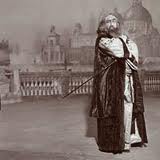 A performance in Yiddish was given last night at Massey Hall of “The Merchant of Venice” by Mr. Jacob P. Adler and a supporting company from the Grand Theatre, New York. There was a large audience of people who evidently understood Yiddish, as the performance was received with outbursts of spontaneous applause at the points in the Shakespearian play which are most effective with a purely English-speaking audience.
A performance in Yiddish was given last night at Massey Hall of “The Merchant of Venice” by Mr. Jacob P. Adler and a supporting company from the Grand Theatre, New York. There was a large audience of people who evidently understood Yiddish, as the performance was received with outbursts of spontaneous applause at the points in the Shakespearian play which are most effective with a purely English-speaking audience.
Mr. Adler’s reputation must have preceded him, as he was greeted on his first appearance with demonstration of enthusiastic applause. The cast of characters on the programme was printed in the Hebrew language, which was an insolvable puzzle to those present who were not among the initiated. Mr. Adler gave in many respects a striking portrayal of Shylock, which in the earlier scenes was somewhat more effusive and less restrained than that of the most popular English impersonators of the role. ♦
* * *
Music and the Drama
From the Toronto Globe, January 6, 1908
 Toronto theatre-goers will have an opportunity this evening of witnessing Miss Blanche Walsh, the American emotional actress, in the production of Jacob Gordin’s great Yiddish play, The Kreutzer Sonata. Contrary to the general opinion, the play bears no relation to Tolstoi’s novel of the same title, but tells a story of Russian life teeming with human emotions, tinctured with a little comedy through some quaint Yiddish characters, and the finale is one of the most passionate and tragic scenes ever witnessed in the modern drama.
Toronto theatre-goers will have an opportunity this evening of witnessing Miss Blanche Walsh, the American emotional actress, in the production of Jacob Gordin’s great Yiddish play, The Kreutzer Sonata. Contrary to the general opinion, the play bears no relation to Tolstoi’s novel of the same title, but tells a story of Russian life teeming with human emotions, tinctured with a little comedy through some quaint Yiddish characters, and the finale is one of the most passionate and tragic scenes ever witnessed in the modern drama.
Mr. Gordin has been termed the Yiddish Shakespeare, having produced over seventy successful plays, of which The Kreutzer Sonata has been pronounced the best. In the role of Hattie, Miss Walsh is said to have reached the highest point in her career as a powerful actress, her interpretation of the part being considered even more brilliant than that of Maslova, in The Resurrection.
The play is staged in handsome style, and Miss Walsh’ costumes are rich and elaborate. The supporting company is said to be a well-balanced one and entirely adequate. ♦
* * *
From the Toronto Daily Star, March 13, 1909
Manager Pasternak of the new Jewish Theatre hoped to have it in shape for opening at the Passover season, but the chances are that it won’t open until next season. The City Architect is not quite satisfied with the way the renovation is being done, and therefore there will be some delay. ♦
* * *
Real Melodrama
Villain in Agnes Street Theatre Got Sword Cut over the Eye
From the Toronto Daily Star, August 9, 1909
While playing the part of the villain in the drama The Wise King, at the Lyric Jewish Theatre, Agnes street, Saturday night, Jacob Goldstein received a severe sword cut over the right eye from a weapon wielded by Isadore Goldberg, another member of the cast, who was playing the part of the king. Goldstein kept on in the fencing bout until the curtain dropped and his wound was attended to. He finished out his part in the show. ♦
* * *
From The Toronto Globe, November 20, 1909
The Jews have long been noted for their histrionic and dramatic talent, and the ancient race has contributed most gifted players and playwrights to the stage of all countries. In the distinct and popular drama of their own, written in the Yiddish dialect, and which is now flourishing in all the Yiddish centres, the Jews have displayed remarkable talent and their theatres have attracted the attention of the best cities, such as New York, Chicago, Philadelphia, Boston and many others. The truth of this will be illustrated on Tuesday and Wednesday of next week at the Princess Theatre, when the noted Edwin A. Relkin’s All-Star Yiddish Company, headed by Mr. David Levenson, and Mme. Diana Feinman, late stars of the Adler’s Grand Theatre, New York city, will be seen. They will be supported by an excellent cast of popular Yiddish players, and will present their latest successes, Die Yiddish Vabel, written by Mr. N. Rackov, and The Proud Jewess, written by the great Yiddish playwright, the late Jacob Gordin. ♦
* * *
Music and Drama, by E. R. Parkhurst
From the Toronto Globe, November 22, 1909
One of the most interesting events to take place in this city will occur on Tuesday and Wednesday evenings at the Princess Theatre, when the famous Edwin A. Relkin’s All-star Yiddish Company, direct from one of the leading Yiddish theatres of New York city, will present their latest successes, The Yiddish Vabele, written by Mr. N. Rackov, and The Proud Jewess, written by the greatest Yiddish playwright, the late Jacob Gordin.
The above company is headed by Mr. David Levenson and Mme. Diana Feinman, late stars of the Adler’s Grand Theatre, New York city, and supported by an excellent cast of popular Yiddish players of New York city. ♦
* * *
Music and Drama, by E. R. Parkhurst
From the Toronto Globe, April 27, 1910
A novelty at Massey Hall last night was the production of the comedy, A Golden Country, in Yiddish by a New York company. There was an audience of about fifteen hundred appreciative admirers of the play and its interpreters. Judging from the continuous laughter that was the accompaniment to the play, it is inferred that it is delightfully humorous. The principal comedian was D. Schoenholtz, who has a free and breezy style, and the leading lady Miss Karpe, who has a gracious comedy method. ♦
* * *
Thespians Held at Frontier
From the Toronto Star, June 11, 1914
Several hundred Hebrews were badly disappointed at the Lyric Theatre last night, when the theatrical company advertised failed to materialize. They had been held up by the immigration authorities at the frontier, and did not arrive until 10 o’clock. The postponed show will be given on Friday. ♦
See also Opening of the Standard Yiddish Theatre, 1922

